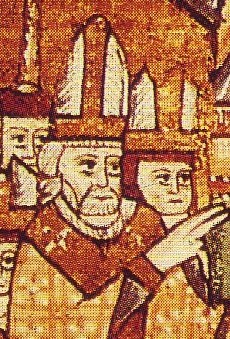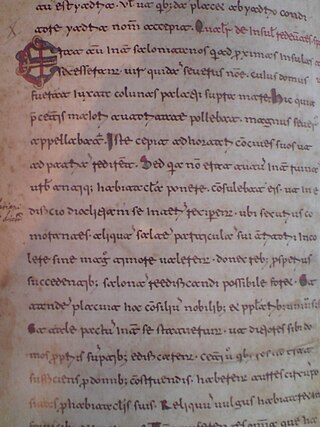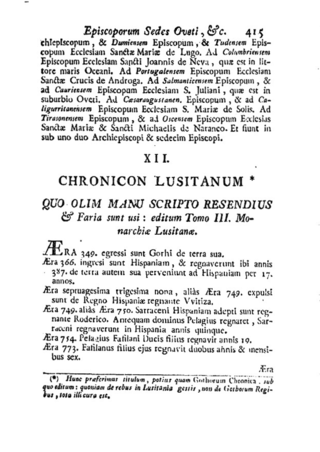Riothamus was a Romano-British military leader, who was active circa AD 470. He fought against the Goths in alliance with the declining Western Roman Empire. He is called "King of the Britons" by the 6th-century historian Jordanes, but the extent of his realm is unclear. Some Arthurian scholars identify Riothamus as one of the possible sources of the legendary King Arthur.
Ranulf II was Count of Poitou from 866 and Duke of Aquitaine from 887. On the death of Charles the Fat in 888, he styled himself King of Aquitaine and did so until 889 or his death, after which the title fell into abeyance.

The name Cumania originated as the Latin exonym for the Cuman–Kipchak confederation, which was a tribal confederation in the western part of the Eurasian Steppe, between the 10th and 13th centuries. The confederation was dominated by two Turkic nomadic tribes: the Cumans and the Kipchaks. Cumania was known in Islamic sources as Dasht-e Qebchaq, which means "Steppe of the Kipchaks"; or "Kipchak Plains", in Persian and al-Qumāniyīn in Arabic. Russian sources have referred to Cumania as the "Polovtsian Steppe", or the "Polovtsian Plain".
Taara, also known as Uku or Jumal, is a prominent god in Estonian mythology, with a strong resemblance to the Finnish Ukko and the Germanic Thor.
Indirect speech, also known as reported speech, indirect discourse (US), or ōrātiō oblīqua, is the practice, common in all Latin historical writers, of reporting spoken or written words indirectly, using different grammatical forms. Passages of indirect speech can extend from a single phrase to an entire paragraph, and this style was generally preferred by Roman historians to the direct speech commonly found in Greek authors.
Geoffrey or Godfrey was the second eldest son of Roger I of Sicily. He was probably a bastard, like his elder brother Jordan, but he may have been a legitimate son by either Judith of Évreux or Eremburga of Mortain. Either way, he stood no chance of inheriting, for he had leprosy, or some similar disease. He never married, but was engaged to a daughter of Boniface del Vasto.

Roi fainéant is a French term primarily used to refer to the later kings of the Merovingian dynasty after they seemed to have lost their initial powers of dominion. It is usually applied to those Frankish rulers approximately from the death of Dagobert I in AD 639 until the deposition of Childeric III in favour of Pepin the Short in 751.
Lucilia is believed to have been the wife of the Roman philosopher Lucretius, though there is little evidence of their relationship, let alone marriage. Moreover, the name 'Lucilia' was not associated with Lucretius until many centuries after his death. In Walter Map's twelfth century work titled De nugis curialium, 'Lucilia' is the name of a woman who murders her husband by giving him a potion that causes him to go insane. It wasn't until 1511, in Pius's vita, that the name 'Lucilia' became associated with Lucretius. Some have even questioned whether this association was made-up for the sake of writing, that is, to maintain literary style.

The Battle on the Raxa river was fought on 16 October 955 over control of the Billung march between the forces of Otto I of Germany allied with the Rani tribe on one side, and the Obotrite federation under Nako and his brother Stoigniew with their allied and tributary Slav neighbours on the other. The Raxa river is identified with either the Recknitz or the Elde river. The German victory over the Slavs followed up on the August victory at the Lechfeld over the Magyars and marked the high point of Otto's reign.
Gaius Fabius Hadrianus was praetor in 84 BC and governor of the Roman province of Africa in 83–82. He is known primarily for the sensational circumstances of his death: during an uprising, the governor's residence was set on fire and Hadrianus was burned alive.

The 1088 papal election subsequent to the death of Pope Victor III in 1087 was held on 12 March 1088. Six cardinal-bishops, assisted by two lower-ranking cardinals, elected Cardinal-Bishop of Ostia Odon de Lagery as the new Pope. He assumed the name Urban II.
The October 1187 papal election was convoked after the death of Pope Urban III. He and the papal court had escaped from the imperial blockade of Verona only the month before, and had taken refuge in Ferrara. The election, held in Ferrara the day after the pope's death, resulted in the election of Cardinal Alberto Sartori di Morra, who took the name of Gregory VIII. He was a partisan of the Emperor Frederick Barbarossa, whose election delighted him. Gregory VIII reigned only two months.

Thomas the Archdeacon, also known as Thomas of Spalato, was a Roman Catholic cleric, historian and chronicler from Split (Spalato). He is often referred to as one of the greatest sources in the historiography of Croatian lands.

The Chronicon Lusitanum or Lusitano is a chronicle of the history of Portugal from the earliest migrations of the Visigoths through the reign of Portugal's first king, Afonso Henriques (1139–85). The entries in the chronicle, ordered by year and dated by the Spanish Era, get increasingly longer and the majority of the text deals with the reign of Afonso. The conventional title of the chronicle means "Lusitanian chronicle" or "chronicle of the Goths". It was first given by the editor Enrique Flórez, who rejected the title under which it had previously been edited because of its subject matter. Flórez also claims that the manuscript of the Chronicon had previously been utilised by André de Resende, the first archaeologist of Portugal, and Manuel Severim de Faria, the first journalist of Portugal; it was also edited in the third volume of the Monarchia Lusitana by António Brandão (1632).
Gundemaro Pinióliz, was a noble from the Kingdom of León, the ancestor of one of the most important Asturian lineages of the Middle Ages, and most likely the great-grandfather of Jimena Díaz, wife of Rodrigo Díaz de Vivar, el Cid.
The Treaty of Sangüesa between Alfonso II of Aragon and Sancho VI of Navarre was signed on 19 December 1168 at the church of San Adrián de Vadoluengo in Sangüesa on the Navarrese side of the river Aragón. It provided for a twenty-year truce and an alliance against Muhammad ibn Mardanis, King of Murcia. Alfonso and Sancho agreed to divide between them the Murcian territory they conquered. They also pledged safe conduct to each other in their kingdoms. At the meeting at Sangüesa, Sancho VI brought with him two legal experts, Pedro Jiménez de Góngora and Lope Íñiguez de Urroz, and the terms he obtained were very favourable to his smaller kingdom.
Hostius Quadra was a Roman slave-owner famed for his sexual licentiousness. He was murdered by his own slaves, supposedly on account of his sexual appetites.
The main Latin tenses can be divided into two groups: the present system, consisting of the present, future, and imperfect; and the perfect system, consisting of the perfect, future perfect, and pluperfect.
A temporal clause is an adverbial clause of time, that is to say, a clause which informs the reader about the time when the action of main verb of the sentence occurred. So in a sentence such as "after I had said this, he went out", the first clause is a temporal clause. The name comes from the Latin word tempus, genitive temporis, 'time".




